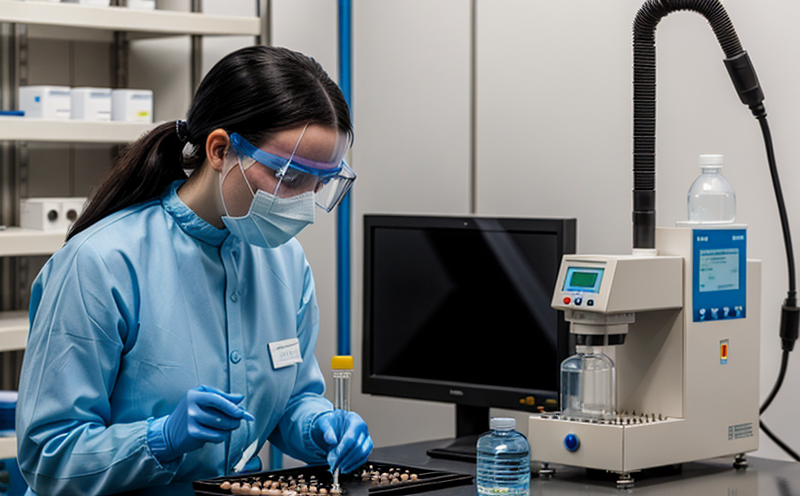Oxidative Stress Degradation Profiling Testing
The pharmaceutical industry is highly regulated and increasingly focused on ensuring drug quality and efficacy. One critical aspect of this focus is understanding how oxidative stress can degrade active pharmaceutical ingredients (APIs) and excipients, potentially leading to reduced product stability and efficacy. Oxidative stress degradation profiling testing provides a robust method for quantifying the extent and nature of API degradation due to reactive oxygen species (ROS). This service plays an essential role in drug development, manufacturing, and quality assurance.
Reactive oxygen species are highly reactive molecules containing oxygen that can cause significant damage to biological systems. In pharmaceuticals, these species can attack APIs during storage or processing, leading to the formation of degradation products that may alter the API's chemical structure, solubility, and bioavailability. Identifying such degradation pathways is crucial for ensuring drug safety and efficacy.
Oxidative stress degradation profiling testing typically involves exposing APIs to controlled oxidative conditions that mimic real-world scenarios (e.g., high temperature, humidity, light). The test subjects are then analyzed using advanced analytical techniques such as High-Performance Liquid Chromatography (HPLC), Mass Spectrometry (MS), and Nuclear Magnetic Resonance (NMR) spectroscopy. These methods allow for the precise identification and quantification of degradation products.
The testing process begins with thorough sample preparation, which may include dissolution in appropriate solvents or dispersion in aqueous solutions. The samples are then subjected to oxidative stress conditions using peroxides like hydrogen peroxide or ozone exposure. After incubation under these conditions for varying durations (typically ranging from days to weeks), the samples are analyzed.
Advanced analytical techniques provide detailed insights into the degradation products, including structural changes and molecular weights. This information is critical for understanding the stability of APIs under oxidative stress conditions. The results can inform formulation adjustments, storage recommendations, and process optimization aimed at enhancing product shelf life and patient safety.
This service is not only beneficial during drug development but also post-market, helping pharmaceutical companies meet regulatory requirements such as those outlined in the US Pharmacopeia (USP) and European Pharmacopoeia (EP). Understanding oxidative stress degradation pathways ensures that APIs remain stable throughout their lifecycle, thereby maintaining product quality and patient trust.
Regulatory authorities like the FDA and EMA require robust data on API stability to ensure drug safety. Oxidative stress degradation profiling testing provides this critical information, enabling pharmaceutical companies to meet these stringent standards. By offering precise and reliable results, this service supports the development of safe and effective medications that can be trusted by healthcare professionals and patients alike.
Given the complexity of oxidative stress mechanisms, it is essential for laboratories performing such tests to have experienced personnel and state-of-the-art facilities. Our team at [Lab Name] has extensive expertise in chemical characterization and impurity profiling, ensuring accurate and reliable test results. We use cutting-edge analytical instruments and follow international standards like ISO 17025 and USP methods to deliver precise data.
Industry Applications
The pharmaceutical industry heavily relies on oxidative stress degradation profiling testing for several key applications:
- Drug Development: Identifying and mitigating potential stability issues early in the development process.
- Process Optimization: Refining manufacturing processes to enhance API stability.
- Quality Control: Ensuring consistent product quality through rigorous testing protocols.
- Regulatory Compliance: Providing comprehensive data to meet regulatory requirements.
- Post-Market Monitoring: Evaluating drug performance in real-world conditions post-approval.
By integrating oxidative stress degradation profiling testing into their workflows, pharmaceutical companies can significantly enhance the quality and safety of their products. This service is particularly valuable for high-value APIs where even minor stability issues could lead to significant market impact or regulatory challenges.
Customer Impact and Satisfaction
The implementation of oxidative stress degradation profiling testing brings several tangible benefits to pharmaceutical companies:
- Enhanced Product Quality: Ensuring that APIs remain stable throughout their lifecycle.
- Improved Regulatory Compliance: Providing robust data for regulatory submissions and inspections.
- Increased Patient Safety: Minimizing the risk of adverse effects due to unstable APIs.
- Cost Savings: Avoiding costly recall efforts by identifying stability issues early in development.
- Reputation Building: Demonstrating a commitment to quality and patient safety, enhancing brand reputation.
Customer satisfaction is a key priority for us at [Lab Name]. By delivering accurate, timely results that align with international standards, we help our clients make informed decisions. Our comprehensive approach ensures that each client's unique needs are met, leading to higher customer retention and loyalty.
Environmental and Sustainability Contributions
In addition to direct benefits for pharmaceutical companies, oxidative stress degradation profiling testing also contributes positively to environmental sustainability:
- Reduced Waste: By identifying stability issues early in the development process, waste from failed batches is minimized.
- Optimized Resource Use: Process optimization leads to more efficient use of raw materials and energy.
- Lower Carbon Footprint: Enhanced product stability can reduce the need for extensive post-market monitoring, leading to lower overall environmental impact.
At [Lab Name], we are committed to contributing positively to sustainability efforts within our industry. By providing reliable data that supports quality and safety, we help pharmaceutical companies make environmentally conscious decisions throughout their product lifecycle.





